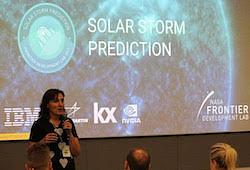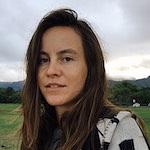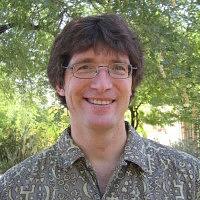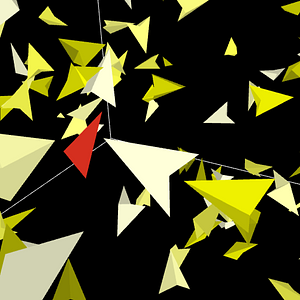- About the Course:
This course will explore how to use agent-based modeling to understand and examine a widely diverse and disparate set of complex problems. During the course, we will explore why agent-based modeling is a powerful new way to understand complex systems, what kinds of systems are amenable to complex systems analysis, and how agent-based modeling has been used in the past to study everything from economics to biology to political science to business and management. We will also teach you how to build a model from the ground up and how to analyze and understand the results of a model using the NetLogo programming language, which is developed and supported at Northwestern University by Uri Wilensky. We will also discuss how to build models that are sound and rigorous. No programming background or knowledge is required, and the methods examined will be useable in any number of different fields.
While this course is in session, the first unit will be completely free and open; we request a modest tuition to continue through the course and to receive a certificate. Once the course is closed, the videos and quizzes will all be open and freely available. A limited number of scholarships are available, please see the FAQ for more details.
Read about a few of the top final peer review model assgiments from 2018 here.
- About the Instructor(s):
 The course instructor, Anamaria Berea has two Ph.D. degrees, one in economics (2010, Academy of Economic Studies of Romania) and one in computational social sciences (2012, George Mason University), giving her a unique background to work at the intersection between different sciences. During her postdoctoral studies at the University of Maryland – Center for Complexity in Business, she won a grant from the National Academies of Sciences – Keck Futures Initiative, to complete an interdisciplinary research project on the emergence of communication in social and biological systems using economic principles, information science, complex systems and computational methods, project fructified by the successful publication of a monograph titled “Emergence of Communication in Socio-Biological Networks”, published by Springer Nature. She has also served as a data scientist (2017) and AI mentor (2018) to the heliophysics and astrobiology teams at the NASA/SETI Frontier Development Lab. In 2018, she won another book project, in a competition honoring Women in Science at InTech Open Publishing House, on fundamental problems of communication emergence and communication as a complex system, titled “A Complex Systems Perspective of Communication from Cells to Societies”.
The course instructor, Anamaria Berea has two Ph.D. degrees, one in economics (2010, Academy of Economic Studies of Romania) and one in computational social sciences (2012, George Mason University), giving her a unique background to work at the intersection between different sciences. During her postdoctoral studies at the University of Maryland – Center for Complexity in Business, she won a grant from the National Academies of Sciences – Keck Futures Initiative, to complete an interdisciplinary research project on the emergence of communication in social and biological systems using economic principles, information science, complex systems and computational methods, project fructified by the successful publication of a monograph titled “Emergence of Communication in Socio-Biological Networks”, published by Springer Nature. She has also served as a data scientist (2017) and AI mentor (2018) to the heliophysics and astrobiology teams at the NASA/SETI Frontier Development Lab. In 2018, she won another book project, in a competition honoring Women in Science at InTech Open Publishing House, on fundamental problems of communication emergence and communication as a complex system, titled “A Complex Systems Perspective of Communication from Cells to Societies”.She is a Teradata University Network Faculty Award Winner (2014) and was a Data Ambassador for the European Court of Human Rights at the Teradata Care Initiative (2014). She has taught both graduate and undergraduate classes at George Mason University, University of Maryland and George Washington University and my research has been published in Journal of Washington Academy of Science, Decision Analytics, AAAI Proceedings, Quantitative Finance, Handbook of Human Computation, Journal of Strategic Security and Global Transitions. Her research has been supported by grants from ONR, IARPA, DARPA and the National Academies of Sciences.
 The course creator and video instructor, Bill Rand is an assistant professor of Business Management at the Poole College of Management at North Carolina State University and a computer scientist by training. He recently co-authored a textbook on agent-based modeling with Uri Wilensky, the author of the NetLogo programming language. He is also the author of over 50 scholarly papers, many of which use agent-based modeling as their core methodology. He received his doctorate in computer science in 2005 from the University of Michigan and was also awarded a postdoctoral fellowship at Northwestern University, where he worked directly with Uri Wilensky as part of the NetLogo development team.
The course creator and video instructor, Bill Rand is an assistant professor of Business Management at the Poole College of Management at North Carolina State University and a computer scientist by training. He recently co-authored a textbook on agent-based modeling with Uri Wilensky, the author of the NetLogo programming language. He is also the author of over 50 scholarly papers, many of which use agent-based modeling as their core methodology. He received his doctorate in computer science in 2005 from the University of Michigan and was also awarded a postdoctoral fellowship at Northwestern University, where he worked directly with Uri Wilensky as part of the NetLogo development team.- Course Team:
 Katarzyna (Kasia) Samson is a social scientist with a complexity science background. She has recently completed a postdoctoral fellowship at the SWPS University of Social Sciences and Humanities in Wroclaw, Poland. She received her Ph.D. in social sciences from the University of Warsaw and worked for five years at the Center for Complex Systems and New Technologies at the Robert B. Zajonc Institute for Social Studies at the University of Warsaw. Her research focuses on trust, social inequality and modeling social processes.
Katarzyna (Kasia) Samson is a social scientist with a complexity science background. She has recently completed a postdoctoral fellowship at the SWPS University of Social Sciences and Humanities in Wroclaw, Poland. She received her Ph.D. in social sciences from the University of Warsaw and worked for five years at the Center for Complex Systems and New Technologies at the Robert B. Zajonc Institute for Social Studies at the University of Warsaw. Her research focuses on trust, social inequality and modeling social processes. John Pepper has a Ph.D. in Biology from the University of Michigan. He is a former SFI postdoctoral scholar and a current member of the SFI External Research faculty. He has used agent-based models to study ecology and evolutionary theory, as well as problems in biomedicine. He specializes in evolutionary theory and its applications. His current professional application is to the problem of the evolution of normal body cells into cancer cells. He is a biologist at the National Cancer Institute, Division of Cancer Biology. He uses the tools of computational and systems biology to better understand the biological processes underlying cancer and to design better interventions for cancer prevention.
John Pepper has a Ph.D. in Biology from the University of Michigan. He is a former SFI postdoctoral scholar and a current member of the SFI External Research faculty. He has used agent-based models to study ecology and evolutionary theory, as well as problems in biomedicine. He specializes in evolutionary theory and its applications. His current professional application is to the problem of the evolution of normal body cells into cancer cells. He is a biologist at the National Cancer Institute, Division of Cancer Biology. He uses the tools of computational and systems biology to better understand the biological processes underlying cancer and to design better interventions for cancer prevention.- Class Introduction:
- Class Introduction
- How to use Complexity Explorer:
- How to use Complexity Explorer
- Enrolled students:
-
1,584
- Course dates:
-
01 Jul 2019 3pm UTC to
21 Sep 2019 5:59am UTC - Prerequisites:
-
None
- Like this course?
- Donate to help fund more like it
- Twitter link
- Follow Course on Twitter
Syllabus
- What is Agent-Based Modeling and Why Should You Use It?
- Building a Simple Model
- Extending Models
- Creating Agent-Based Models
- The Components of an Agent-Based Model
- Analyzing Agent-Based Models
- Verification, Validation, and Replication
- History of ABM and Classic Models
- Advanced ABM
